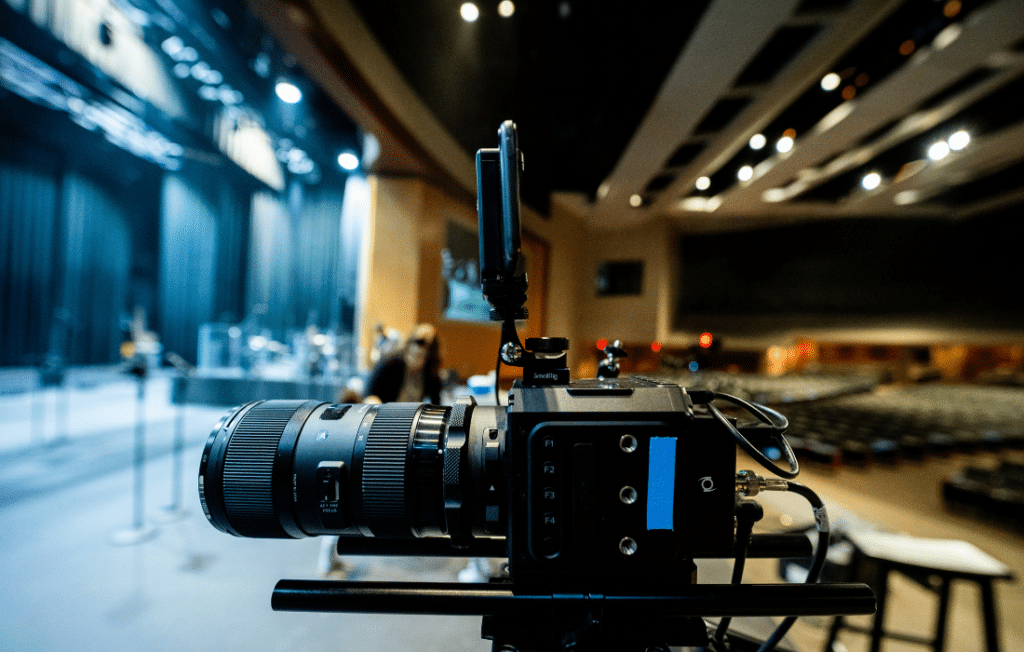Let’s Talk About the Basics of Lenses
Estimated reading time: 5 minutes
Written by Colette Nichol, Solo Filmmaker and Story Strategist
What is the BEST lens for filmmaking?
This is a common question. And it’s entirely understandable.

But there’s no ONE right answer.
I’m in the midst of updating a blog post about the “best” lens for video, and I want to share some things that everyone should know about lenses.
Because lenses matter a lot.
Like A LOT.
They’re an important part of your toolkit as a filmmaker, so it’s important to learn what you can little-by-little until eventually you can select and use lenses with ease and bring your creative visions to life!
10 Must-Know Lens Facts for Solo Filmmakers and Micro-Budget Filmmakers
1) IMAGERY
Your lens will have as much of an effect on your image as your camera. Your lens affects the colour, saturation, sharpness, and bokeh of the image.
2) COST
Cinema lenses cost $5000+. What does that tell you about how important these darn things are for movie makers? Erm, very important. But don’t worry, you don’t have to spend that much. Just use a quality zoom when getting started.

3) INVESTMENT
A lens is an investment. If treated well, it can last a lifetime. Always use a lens hood and a filter on your lens to protect the glass.
4) STABILIZATION
Some lenses have built-in stabilization while others don’t. If you’re shooting on a tripod or using another stabilizer, you don’t need to worry about this.

5) FOCAL LENGTH
The longer the lens (the more zoomed in, the higher the focal length number) the more shaky and wobbly your footage will appear if you don’t use your camera on a tripod or gimbal. For example, trying to shoot handheld with a 80mm lens is a losing battle.
6) FOCAL LENGTH & SHALLOW DEPTH OF FIELD
The longer the lens, the more careful you need to be when setting your focus because longer lenses give you shallower depth of field, so it’s easy to end up a little bit off.
7) AUTO FOCUS & FOCUS PULLERS
Cinema lenses do not have auto focus or follow focus. So it’s worth getting into the habit of focusing manually when shooting video. To track a subject with a cinema lens you need a dedicated person who is your Focus Puller.
8) PRIMES vs ZOOMS
For most solo filmmakers, using single focal length cinema lenses (primes) isn’t the best choice. Instead, a zoom gives you the most flexbility and for run-and-gun shooters is the only logical choice.
9) F/2.8
For every full f-stop, you let in twice the amount of light. Sounds like no big deal? But if you’re shooting indoors with not studio lights, this is a HUGE deal. So having a lens with an f-stop of f/2.8 or lower is important for lenses you’ll be using indoors.
10) F-STOP & DEPTH OF FIELD
F-stop numbers are how we measure the aperture of a lens. The aperture is the iris or opening in a lens that opens wide to let more light in or is closed down to let less light in. Your aperture also affects the depth of field.
Higher number = greater depth of field.
Lower number = shallower depth of field and a blurrier background/foreground.
While this list might be short, it’s critical for every solo filmmaker to understand lenses and how to use them.
You have images in your head, and if you know manual exposure and understand lenses, then you can turn that vision into a reality.
Eventually, if not already, you’ll become a lens nerd.
Read More:
⭐ These Are the BEST Lenses for Video, Hands Down
⭐ Hey, What’s the Best Canon Lens for Video? Let me tell you!
Learn Filmmaking
+ Get the Gear Guide
If you’re interested in learning filmmaking, check out the Solo Filmmaking Mentorship Program I created for aspiring filmmakers and video creators. It usually goes live once per year. So I recommend getting the Story Envelope Filmmaking letter which comes out a couple of times per month. That way, you can get filmmaking tips for free and find out when the filmmaking course is going live again.
Also, before you go, grab the Solo Filmmaking Gear Guide and Checklist for Beginners.

About the Author
Hi! I’m Colette Nichol. I’m a solo filmmaker and story strategist based out of rainy Vancouver, Canada. I’ve been making videos and micro films for small businesses and global brands since 2014.
Plus, I LOVE to help aspiring filmmakers pursue their dreams and start making films. This blog is designed to help you gain the knowledge you need to become a filmmaker.
If you want more, get on the waitlist for the Story Envelope Academy Solo Filmmaking Mentorship Program. It opens up one time per year and is the best way to become a filmmaking or video pro fast!
CLICK HERE to get on the solo filmmaking mentorship waitlist.